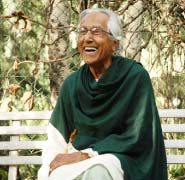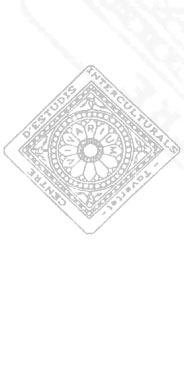



VITAL AND INTELLECTUAL JOURNEYS
1. An Outstanding Man. Raimon Panikkar’s Fourfold Identity
Raimon Panikkar’s existential and intellectual journeys have been long, rich and unusual, with multiple dimensions in his life. His Hindu-Christian origin has been enriched with a multiple formation: scholarly, intellectual and interdisciplinary, as well as intercultural and interreligious.
Raimon Panikkar is doubtless one of the great thinkers of our time, as it has been acknowledged many times. Among his more recent distinctions we can mention:
Premio Antonio Machado for his book Paz y desarme Cultural (1990).
Doctorate Honoris Causa, Illes Balears University, Spain (1997).
Premio Memorial Juan XXIII por la Paz, awarded by the Instituto de Polemología (1998).
“Creu de Sant Jordi” awarded by the Generalitat de Catalunya (Catalan Government, 1999).
Premio Espiritualidad 2000 for his book El mundanal silencio;
“Chevalier des Arts e des Lettres” awarded by the French Government (2000);
Premio Nonino (Italy) for being a “Maestro per il nostro tempo” (2001);
Medal of the Presidency of the Italian Republic (2001);
Premio Casa Asia for the dialogue between East and West (2004).
Doctorate Honoris Causa, Tübingen University, Germany (2004).
Doctorate Honoris Causa, Urbino University, Italy (2005).
Doctorate Honoris Causa, Girona University, Catalonia (2008).
Panikkar has been developing a fourfold identity througout his life: he was born and brought up as a Christian; Hinduism was equally part of his heritage, although he discovered it more slowly (“I had to let it emerge in me”, he says); Buddhism, which developed in him in quite a natural way (“as a result of inner work”), and finally his secular identity, as a result of his interaction with the modern Western world.
I have only related the Buddha’s message to our modern predicament. I have neither rejected Christ nor denied allegiance to other traditions
Why should we build walls of separation and feel jealous about constituencies? To extol one religious and human tradition does not mean to belittle the others. Synthesis may not seem likely. Perhaps no synthesis is possible. But that does not mean that the alternative is either one-sidedness or eclecticism. (“Preface to the English Edition”, The Silence of God: The Answer of the Buddha)
Panikkar’s fourfold identity is fertilized by the four traditions mentioned above, to the extent that we cannot understand him unless we know how he sees the profound interior dialogue that has unfolded within him:
An inner dialogue within one’s own self, a meeting with another religious experience in the depths of one’s own personal religiosity, at that most intimate level… An intra-religious dialogue that I have to begin myself, asking mysyelf about the relativity of my beliefs, accepting the challenge of a conversion and the risk of having to alter my traditional positions. (“El diálogo interno: la insuficiencia de la llamada ‘epoché’ fenomenológica en el encuentro religioso”, Salmanticensis, 2, 1975).
Panikkar has been sometimes called a syncretist, but nothing would be farther from the truth; he knows very well that syncretism destroys the richness implicit in the varieties of religious experiences, which he sees as a fundamental wealth of the diverse human cultures. On the other hand, in spite of his opening to the polyphonic religious universe, Panikkar acknowledges that he doesn’t belong to all traditions; he respects and studies all of them, but they may not be part of his identity: “I can say that I am a secular Man, a Christian, a Hindu or a Buddhist… but I cannot say that I am for instance a Muslim or a Parsi. I sympathize and have some knowledge about other religions, but in this case I can speak of other” (“Epilogue” to Pinchas Lapide and Raimon Panikkar, Meinen wir denselben Gott? Ein Streitgespräch, München, 1994).
*3. India. Christian-Hindu-Buddhist symbiosis. Meeting Monchanin and Le Saux (1955-1966)
*4. University teaching in California (1966-1987)
*5. His return to his Catalan roots to complete his vital cycle
*6. Raimon Panikkar: Writing as a Life-style
